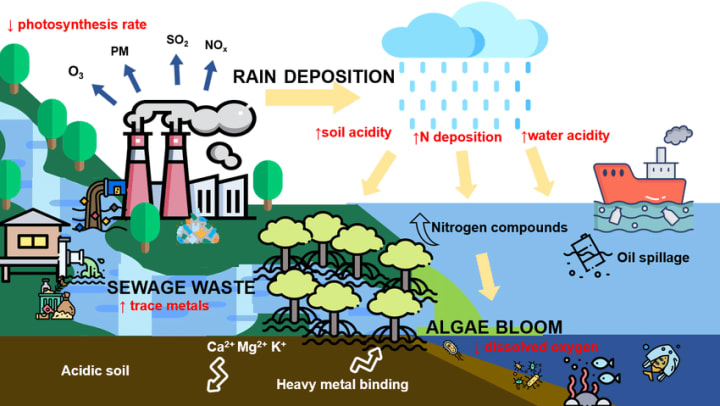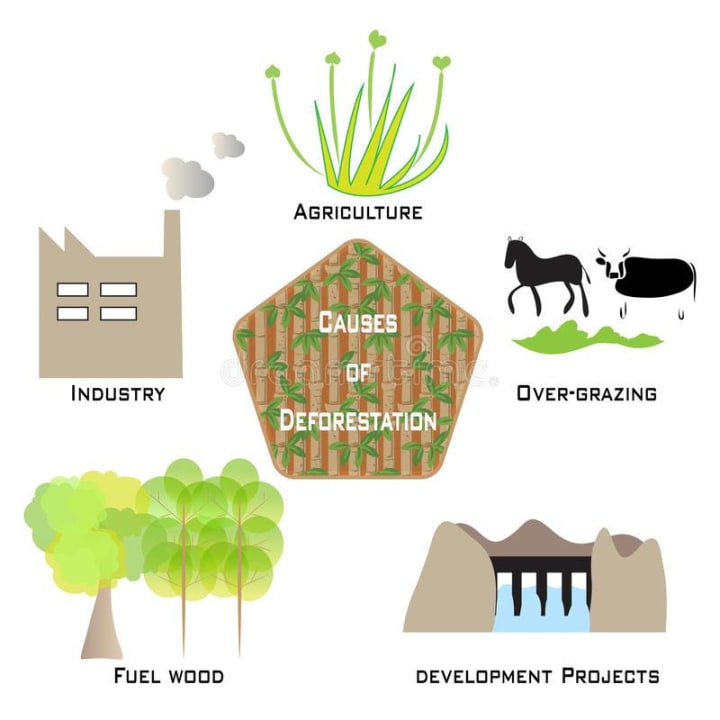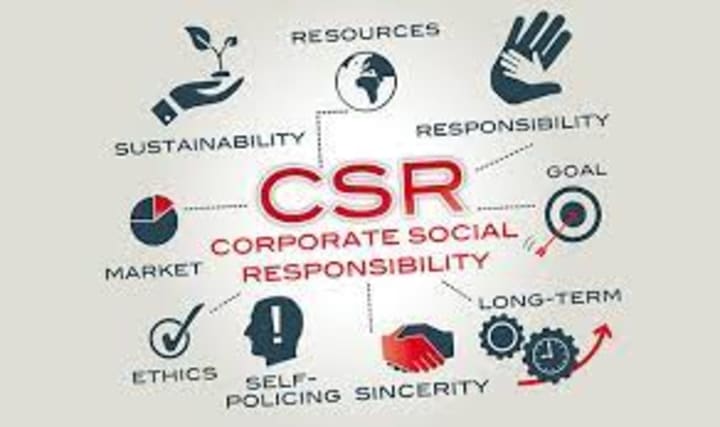Environmental Issues and CSR (Corporate Social Responsibility)
Environmental Issues

Environmental issues are more pressing today than at any previous moment in recent memory. Environmental change, deforestation, pollution, and the exploitation of common resources pose serious threats to our world and humans in the future. Recognising the gravity of the situation, companies worldwide are adopting corporate social responsibility (CSR) as a means to solve natural issues and contribute to a manageable turn of events. This blog analyses the intersection between economic issues and CSR, emphasising enterprises' critical role in constructing a viable future.
Understanding Corporate Social Responsibility (CSR)
CSR refers to an organization's commitment to operating morally and mindfully, considering its activities' social, monetary, and natural consequences. It goes beyond benefit-making to emphasise creating shared incentives for all partners, including employees, clients, networks, and the environment. Organisations may significantly affect society and contribute to the practical outcome of events by incorporating CSR into their business practices.

Environmental Issues and Their Impact
Our globe is confronted with an extensive range of climate change concerns that need prompt attention and purposeful efforts on the part of individuals, networks, nations, and organisations. These challenges, ranging from environmental change to pollution, have far-reaching consequences for the world's biological systems, biodiversity, and human prosperity.
Climate Change: A Worldwide Crisis
Climate change is often regarded as the most pressing and complex environmental issue of our day. Human actions, specifically the use of fossil fuels and deforestation, have resulted in an excess of greenhouse gases being released into the atmosphere. As a result, global warming has occurred, resulting in rising temperatures, irregular weather patterns, melting ice caps, and sea-level rise.

Biodiversity Misfortune A Danger to Biological Systems
The insufficiency of biodiversity is another introductory ecological issue. mortal exercises like terrain annihilation, impurity, overexploitation of regular means, and the donation of intrusive species have urged a critical drop in beast groups' millions. It likewise compromises abecedarian administrations given generally, like fertilization, supplement cycling, and water cleaning, which are pivotal for mortal substance.
Impurity Corruption of Air, Water, and Soil
impurity in its different structures presents serious troubles to both the climate and mortal well-being. Air impurity, basically brought about by ultramodern effluences, vehicle exhaust, and consuming petroleum derivations, adds to respiratory affections, environmental change, and the corruption of natural systems. Water impurity, coming about because of ultramodern waste, horticultural overflow, and ill- advised scrap junking, debases brackish sources, hurts ocean- going life, and postures good troubles to people. Soil impurity, driven by ill- advised scrap junking and the application of substance coprolites and fungicides, impacting agricultural effectiveness and food security.

Deforestation: A Danger to Woods Biological systems
Deforestation, driven by farming, logging, urbanization, and foundation improvement, significantly affects our planet. Woods assume an urgent part in managing the environment by retaining carbon dioxide, a significant ozone-depleting substance. Their obliteration prompts expanded fossil fuel byproducts and compounds environmental change. Deforestation likewise annihilates environments, disturbs biological systems, compromises biodiversity, and denies nearby networks of fundamental assets.

The Role of CSR in Addressing Environmental Issues
Organizations have a novel chance to relieve natural issues and advance manageability through CSR drives. How it's done:
1. Reasonable Tasks: Taking on maintainable practices inside their activities is essential for organizations. This includes lessening energy utilization, limiting waste age, taking on environmentally friendly power sources, and carrying out productive stock chains.
2. Ecological Preservation: Organizations can effectively partake in protection endeavours by supporting reforestation projects, safeguarding biodiversity areas of interest, and advancing maintainable land the executives rehearse.
3. Item Advancement: Growing harmless to the ecosystem items and administrations can altogether diminish the natural impression of organizations. This can incorporate planning energy-effective machines, advancing reusing, and utilizing eco-accommodating materials.
4. Partner Commitment: Drawing in with partners, including representatives, clients, and networks, is fundamental for compelling CSR. Organizations can instruct and bring issues to light about ecological issues, empowering conduct changes and aggregate activity.
5. Cooperation and Promotion: By working together with industry peers, non-benefit associations, and states, organizations can advocate for strategies and practices that help ecological manageability. This incorporates campaigning for stricter ecological guidelines and partaking in drives to battle environmental change.
Change Aversion and Aggregate Activity
The ecological issues mentioned above are not isolated problems, but rather interrelated challenges that need immediate attention and collective action. States, organisations, networks, and individuals all have a role in addressing these difficulties and promoting natural supportability.
Legislators should approve and authorise ways and recommendations that focus on natural security, promote sustainable practices, and accelerate research for cleaner inventions.
1. Beneficial Practises: Organisations should adopt economic practices that reduce their biological impact, emphasise asset effectiveness, and restrict squandering age. This includes adopting ecologically friendly energy, adhering to global economic norms, and developing trustworthy supply networks.
2. Training and Mindfulness: Educating the general public about ecological concerns is critical for instilling a sense of responsibility and energising individual efforts. Mindfulness crusades, informative initiatives, and community involvement may promote rational behaviour and advance an ecological stewardship culture.
3. Preservation and Rebuilding: Protecting and reestablishing biological systems such as timberlands, wetlands, and coral reefs is critical for preserving biodiversity, mitigating environmental change, and ensuring the planet's long-term well-being. Supporting environmental organisations and participating in reclamation efforts can have a significant impact.
4. Possible Application: People may contribute to environmental sustainability by making wise decisions in their daily lives. This includes reducing waste, conserving energy and water, promoting appropriate things and administrations, and advocating for change through collective effort and skilled leadership.
The Advantages of Natural CSR
Taking part in natural CSR drives offers a few advantages for organizations:
1. Enhanced Standing: Showing a promise of natural manageability can improve an organization's standing and fabricate trust among clients, financial backers, and the overall population.
2. Improved Representative Spirit and Enrollment: Workers are progressively looking for deliberate work and falling in line with organizations that focus on supportability. Participating in natural CSR drives can lift workers a feeling of confidence and draw in top ability.
3. Cost Reserve funds: Embracing reasonable practices frequently prompts cost investment funds over the long haul. Energy-effective tasks, squandering decrease, and asset streamlining can bring about lower functional costs.
4. Future-sealing Business: By resolving ecological issues proactively, organizations can future-verification their tasks and adjust to changing business sector elements. Embracing maintainability today gets ready organizations for a greener and stronger future.

As the world wrestles with squeezing ecological difficulties, organizations should move forward and embrace their part in building a maintainable future. Corporate Social Obligation gives a system to organizations to resolve natural issues and add to worldwide supportability objectives. By coordinating feasible works, connecting with partners, and upholding change, organizations can have a beneficial outcome, leaving an enduring tradition of ecological stewardship for a long time into the future. Allow all of us to cooperate towards a greener, more practical world.
About the Creator
Nisha Suman
Look at the sky. We are not alone. The whole universe is friendly to us and conspires only to give the best to those who dream and work.
A. P. J. Abdul Kalam






Comments
There are no comments for this story
Be the first to respond and start the conversation.